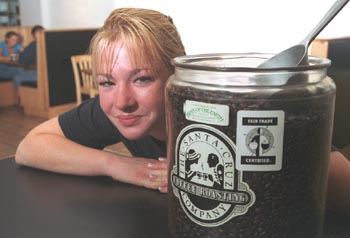![[MetroActive Dining]](/gifs/dining468.gif)
[ Dining Index | Santa Cruz | MetroActive Central | Archives ]
Percolating: Melanie Dolezal shows off the new Fair Trade Roaster beans.
Guilt-Free Java
Fair Trade Roaster beans benefit
growers instead of middlemen
By Janet Blaser
IT'S ALL ABOUT ETHICS and accountability these days. From dolphin-safe tuna to non-sweatshop-made sneakers, from extended family-leave policies to flex-work schedules, corporate America (and beyond) seems to be looking at something besides profit, profit, profit. You know, maybe what we do and say really matters. Maybe we can make a difference in the quality of our lives by how we live them. And maybe, just maybe, we're finally growing up and realizing there's more to life than what meets the eye.
The Santa Cruz Coffee Roasting Company is one local company that's put its money where its mouth is by voluntarily--eagerly, even--becoming the first certified Fair Trade Roaster in the county. For the past few months, they've been carrying nine varieties of organic beans purchased through TransFair USA, a nonprofit group that eliminates the middleman between the coffee farmers and retailers, thereby allowing these Third World farmers to make a living wage. Java-giant Starbucks jumped on the Fair Trade bandwagon only after being faced with an intense and very public campaign from several big-name environmental groups. In the fall, at least two varieties of Fair Trade beans will be available in the 2,000 U.S. Starbucks stores, including our own downtown and Capitola locations.
While Fair Trade coffee has been available all over Europe for the past decade, it is only since 1999 that U.S. markets have been involved in this level of direct corporate accountability. It's a noble effort, and one worthy of our support. With coffee being the world's second most heavily traded product (after--what else?--oil), you can imagine the dollars that pour through the trade. Few end up in the pockets of the farmers who actually tend the coffee plants, haul the 100-pound sacks, or sort and dry the beans by hand. I've seen this firsthand in Jamaica, where 100 percent Blue Mountain Coffee, grown only on one side and at certain altitudes of the fabled Blue Mountains, fetches $35 and more a pound, with most of it sold prior to harvest to Japanese and European dealers. Yet many of the farms seem to be out of another century: donkeys traverse tiny dirt paths through lush jungle; teenage boys in bare feet use handmade wooden rakes to spread the green beans on concrete slabs to dry; little girls and women package the roasted beans in burlap bags, working on treadle sewing machines; older women sit for eight hours a day pasting labels on tins with a toothbrush and bowl of white glue. Yes, these jobs feed their families and afford security--many of the families have worked on the same coffee plantations for generations. But it's a subsistence life, with little chance for change or improvement--or education.
If you'd like more information on Fair Trade Certified products, visit www.transfairusa.org. Otherwise, look for the Fair Trade Certified label at your favorite coffee shop--in this case the Santa Cruz Coffee Roasting Company on Pacific Avenue. You'll find Fair Trade beans in many varieties: Mexican Pluma Altura, Tres Americas, Bean of the Earth, Guatamalan, Organic Espresso, Beethoven's Blend, Sumatran and Guatamalan Decaf; all are organic. They do cost more, but the money goes to the farmers.
And then there's the case in France involving 10 sheep farmers in the little town of Milau ... (no, this is not a joke). Seems that the townsfolk were more than a little unhappy with the recent construction of a McDonald's in their historic 12th-century village. So, a group of farmers ransacked the construction site on the grounds they were protesting the general issue of la malbouffe--bad food--and the more specific issue of the Clinton administration's levying of tariffs on the export of Roquefort cheese as a penalty for the European Union not allowing hormone-fed U.S. beef into its markets.
[ Santa Cruz | MetroActive Central | Archives ]
Copyright © Metro Publishing Inc. Maintained by Boulevards New Media.
![]()

Photograph by Ivan Kashinsky
Got a food tip? Email Janet at [email protected].
From the August 2-9, 2000 issue of Metro Santa Cruz.